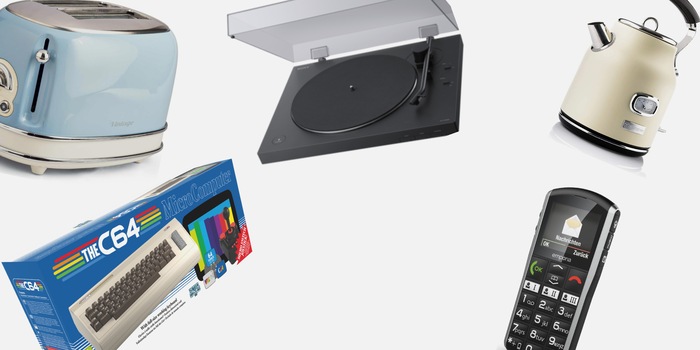
Behind the scenes
Is Gardena’s heyday over? China is taking the robotic lawnmower market by storm
by Alex Hämmerli

Toasters, kettles, furniture: more and more kitchens and living rooms look like they did in the 50s, 70s or 90s. Electrical appliances are being made again in the same style as those seen in old James Bond films or in grandma and grandpa's homes. Sales of record players (+36% on the previous year), keypad mobile phones (+66%) and analogue cameras (+29%) are on the rise. Why is that?
The kettle in the company kitchen looks like it's been taken from the set of the TV series ‘Lost’ and has been in Desmond Hume's 1970s apartment for years: it looks like a well-preserved museum piece, has a strange beige colour, fulfils its function, seems built to last. It makes the retro fans in the office feel good in the kitchen.
We recently analysed the sales figures for cameras and push-button mobile phones in detail, you can find the links here:
Have you also fallen for the retro trend? What have you bought, what would you like?
A soft spot for good series, loud music, science fiction and (second division) football. As PR Manager, I am available to answer journalists' questions about Galaxus and honest e-commerce.
News about features in our shop, information from marketing and logistics, and much more.
Show all
Behind the scenes
by Alex Hämmerli

Behind the scenes
by Daniel Borchers

Behind the scenes
by Daniel Borchers
Apparently, they're not alone: Galaxus has been recording a strong increase in sales of kettles for years. So far, customers have bought 24 per cent more in 2024 than in the same period in 2023. And among the 30 bestsellers alone, there are five devices that have the term ‘retro’ in their name. They would also have been at home in a Lost series or early James Bond film. What's more, even best-selling kettles that aren't labelled as ‘retro’ sometimes feature old-fashioned design elements.
It's even more pronounced with toasters: Galaxus has sold over 25 per cent more toasters in Switzerland and the EU in 2024 than in 2023. And the top 25 includes seven toasters that use the term ‘vintage’ or ‘50s Style’ in their name. So the retro trend is driving sales of certain product groups and shaping others.
Why is that? Nicola Brand, Senior Category Business Manager at Galaxus, tries to answer: ‘I can think of several explanations: Many may assume that products used to be of higher quality and lasted longer. That's why people like to buy a product that looks like it's from the 50s or 70s. Or it's a yearning for the past, nostalgia, reminiscing.‘ Are manufacturers encouraging this trend? What do you hear when you talk to them? “I don't think manufacturers are ”encouraging’ it. However, the manufacturers who offer retro-style products are increasingly focusing on offering the entire product range in the same style. So it may be that, in addition to kettles and toasters, new products such as microwaves or kitchen appliances in a retro style, as can be seen, for example, from the SMEG brand.’
What does a designer have to say about the retro trend? Joe Griesbach is a product designer in the creative department of Galaxus. He finds it ‘exciting that nowadays, especially the 60s to 80s of American design are perceived as retro’ and says: ‘Retro design is particularly valued for its ability to evoke nostalgic emotions and create an authentic connection to the past. The curved lines of the 60s, the bright colours of the 80s and the ‘Made to Last’ value proposition of traditional craftsmanship combine to create a design that stands out from the current, often modern and purist trends. This is achieved by placing a greater emphasis on vibrant colours and shapes.’ By ‘Made to Last’, he means the use of higher-quality materials that are rarely used today, such as metal casings instead of plastic injection moulding.
You can search for the term «retro» on Galaxus: around 8,000 products from dozens of categories are listed on galaxus.ch, with 2,500 on galaxus.de. But there are also certain product types that are retro in themselves and fuel the trend. These include, for example, record players (de/ch), keypad mobile phones ([de](https://www.galaxus.de /de/s1/producttype/tastenhandy-3722)/ch), analogue cameras (de/ch) or retro gaming products (de/ch) such as game consoles from the 90s and 00s. Sales in the categories of record players, analogue cameras and retro gaming have increased since 2021, in some cases with annual growth of 30 to 70 per cent.
The graphic shows that retro products have seen significant increases in sales in recent years and continue to grow year on year. A glance at the record market also confirms the trend: around 4.6 million records were sold in Germany in 2023, according to Statista. That's 300,000 more than in the previous year and around seven times more than in 2011. According to the industry association, the trend is also evident in Switzerland (https://starzone.ch/articles/vinyl-destination-die-plattenverkaufe-sind-zuruck-an-der-spitze).